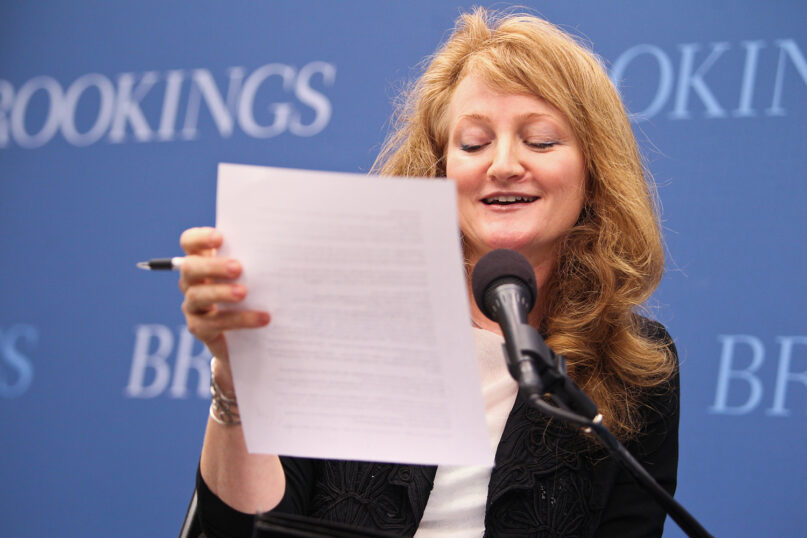(RNS) — In a world that was rapidly digitizing pre-2020, the pandemic provided a push over the edge. Some of the final holdouts against a wholly screen-mediated existence — think kindergartens, Broadway theaters and religious communities — were suddenly forced to make a choice: go digital, or cease to exist.
It was a rocky adjustment for many, especially those leading communities that have historically relied exclusively on in-person interaction. But for Krista Tippett, host of the spirituality-centric radio show and podcast “On Being,” which reaches more than a million listeners every month, the shift to digital represented a potential adventure.
Perhaps, she thought, as we’re questioning the legitimacy of the police, whether or not we need offices to work in, and if prisons ought to exist, we can also ask some questions about what it means to gather in spiritual communities.
“All of our institutions are having an existential crisis,” she told Religion News Service. “The forms that came out of the 20th century just don’t work. … All of our disciplines have to change to meet what we know now and who we are now and how the world works.”
So, while synagogues were figuring out how to livestream their services, and churches were debating the merits of touchless Eucharist, Tippett got to work on an app. Though she resists those who would say to her (and they do say to her) “’On Being’ is my church,” Tippett knows that her more than two decades of public conversations with spiritual leaders, scientists, poets and activists have already come to serve as a sort of spiritual haven on the airwaves.
The goal with the app is to gather some of the most potent learnings from Tippett’s conversations, as well as the community that’s drawn to them, in one place. The result, called the Wisdom App, launched quietly in mid-July.
The app hosts audio content broken up into “courses” that focus on a specific subject matter, the first being hope. Throughout a course, users can listen to curated 10- or 15-minute segments of conversations with “On Being” guests like Bryan Stevenson and the Rev. angel Kyodo williams, in addition to working through short contemplative practices guided by Tippett. Full episodes and transcripts of “On Being” are also available on the app.
The shorter-form content marks a departure for Tippett. An aspect that sets her podcast apart is the lengthy, in-depth conversations with guests, and Tippett still believes in the need for public conversations that require a long attention span. But she sees the value in pithier forms of communication, too. She joked that Jesus and Buddha “would’ve been good at Twitter,” pointing out their aptitude for boiling earth-shatteringly large concepts down into short, digestible phrases that stick with you. The Wisdom App represents Tippett’s own attempt at distillation.
She sees the Wisdom App as fitting into a space currently populated mostly by meditation or mindfulness-centric apps but believes it will fill a niche that is currently underrepresented.
“Meditation is an incredible spiritual technology,” she said, “but meditation alone does not constitute the fullness of the possibilities of a contemplative practice, nor does it suffice for wellness and well-being.” She hopes offerings from the Wisdom App could fill in some of the gaps for those seeking, well, wisdom.
At first blush, Tippett seems like an unlikely champion for an app meant to further digitize spiritual practices. The 60-year-old said that she’s not quick to hop onto every new social media platform that comes out, and she admitted her life is “not highly digitized compared to a lot of lives.” Plus, her show avoids the common media obsessions with youth and quick soundbites in favor of long conversations and guest lineups that skew older and grayer.
But on the other hand, Tippett sees the app space — which she said is largely built around audio already — as a natural extension of podcasting and radio. When radio was first invented, it likely seemed disembodied, she said; now it feels to many like a remarkably intimate medium, where listeners come away with the sense they’re really getting to know their favorite podcast and radio hosts. In other words: We’ve been adapting to new forms of connecting with other people for a long time. This is just another stop on the journey.
More than anything, though, Tippett’s struck by the sense that online life is increasingly a central part of the human experience. To that end, she said, it’s worth investing in and building the kind of world we want, both online and off — and that includes our approach to spirituality.
“This is where human beings are hanging out and falling in love and building community and practicing their trade and conducting their friendships,” she said. “So I think we have to put real intelligence and muscle and goodwill toward shaping more humane digital experiences.”





